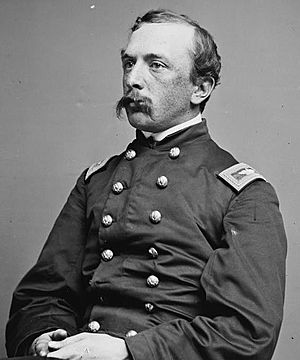Francis Fessenden facts for kids
Quick facts for kids
Francis Fessenden
|
|
|---|---|

Col. Francis Fessenden
|
|
| Born | March 18, 1839 Portland, Maine, US |
| Died | January 2, 1906 (aged 66) Portland, Maine, US |
| Place of burial |
Evergreen Cemetery, Portland, Maine
|
| Allegiance | United States of America Union |
| Service/ |
United States Army Union Army |
| Years of service | 1861–1866 |
| Rank | (Regular Army) |
| Commands held | 25th Maine Volunteer Infantry Regiment 30th Maine Volunteer Infantry Regiment 1st Division of the Department of West Virginia |
| Battles/wars | American Civil War |
| Relations |
|
| Signature | |
| Mayor of Portland, Maine | |
| In office 1876–1876 |
|
| Personal details | |
| Resting place | Evergreen Cemetery |
| Political party | Republican |
| Alma mater |
|
| Occupation | Lawyer |
Francis Fessenden (born March 18, 1839 – died January 2, 1906) was an American lawyer, a leader in politics, and a soldier. He was from the state of Maine. During the American Civil War, he served as a general in the Union Army. His family, the Fessendens, was very important in national politics during the mid-1800s.
Early Life and Education
Francis Fessenden was born in Portland, Maine, in the spring of 1839. His father was William P. Fessenden, who was a U.S. Senator. Francis also had a brother named James Deering Fessenden, who became a general in the Union army too. Sadly, another brother, Samuel, died in the war at the Second Battle of Bull Run. Two of his uncles, Samuel C. Fessenden and T. A. D. Fessenden, were members of the United States Congress.
Francis went to local schools in Portland. He then graduated from Bowdoin College in 1858. After that, he studied law at Harvard Law School. He passed his exams and joined his father's law firm to work as a lawyer.
Serving in the Civil War
When the Civil War began, Francis Fessenden joined the army. On May 14, 1861, he became a captain in the Regular Army. This was a new group called the 19th U.S. Infantry. For much of that year, he helped recruit new soldiers for the army.
In January 1862, he started working as an officer in the Army of the Cumberland in Tennessee. He was badly hurt in April 1862 at the Battle of Shiloh. Later, he became a colonel of the 25th Maine Infantry. He led a large group of soldiers, called a brigade, in the defenses around Washington, D.C.. That same year, he married Ellen Winslow. She was the daughter of Edward Fox from Portland.
In July 1863, his time serving as a volunteer soldier ended. He went back to being a captain in the 19th U.S. Infantry. In September, Fessenden was made a colonel again. This time, he led the 30th Maine Veteran Infantry.
On May 10, 1864, he was promoted to brigadier general. Later that year, he led a brigade in the army of Nathaniel P. Banks during the Red River Campaign. He fought in several battles during this campaign. These included Sabine Crossroads, Pleasant Hill, and Monet's Ferry. At Monet's Ferry, he led a big attack. During this attack, he was severely wounded in his leg, and it had to be removed. After he recovered, he worked on administrative tasks for the rest of the war. He was in charge of different army bases and supply groups.
Life After the War
After the war ended, Fessenden stayed in the army for a short time. He was part of a special military group that oversaw the trial of Henry Wirz. Wirz was in charge of the Andersonville Prison in Georgia. Fessenden also served as the head of a military court that looked into army matters. On November 19, 1865, he was promoted to major general of volunteers. He was then put in charge of the 1st Division of the Department of West Virginia.
In 1866, he worked for the Bureau of Refugees, Freedmen and Abandoned Lands. This group helped former enslaved people and others after the war. He decided not to become a lieutenant colonel in the 45th U.S. Infantry in August 1866. Later that year, he moved to the 28th U.S. Infantry when the army was reorganized. He left the Regular Army on November 1, 1866, with the rank of brigadier general.
Fessenden then went back home to Portland, Maine. He started working as a lawyer again. In 1876, he was elected as the mayor of Portland. He was a member of the Republican Party. He wrote a book about his father called The Life and Services of William Pitt Fessenden. It was published in 1907.
He was also a member of a military society called the Military Order of the Loyal Legion of the United States. This group was for officers who served the Union during the Civil War. On October 28, 1881, he became the leader of the Maine group. He was also part of the General Society of Colonial Wars.
Francis Fessenden passed away in Portland. He is buried in Evergreen Cemetery.
See Also
- List of American Civil War generals (Union)
 | Frances Mary Albrier |
 | Whitney Young |
 | Muhammad Ali |

